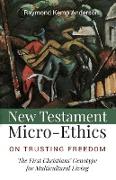New Testament Micro-Ethics
BücherAngebote / Angebote:
Anderson shows how Early Christians' faith took root in a multicultural world just as diverse and conflicted as our own. Their basic attitude turns out to have been one of astounding freedom--not a cultus of rules, but a matter of whole-hearted response, for they lived in conversation with the One whose love for all his wayward creatures is utterly tenacious. We find ourselves continually surprised by an insistent grace that treasures all persons equally while exposing and deposing our evil. Such faith still evokes basic confidence, and we find ourselves, ever again moved by gratitude and trusting each others' Christ-emboldened freedom. If we are embraced by grace, our becoming "great again" can only mean unlimited concern for all and free-flowing interactive service. The playful work ethic that ensues holds promise for our politically splintered post-industrial age. The New Testament's seed-like ethical genotype still unfolds into a secure, all-embracing, and mutually supportive "sabbatic" life stance. What could be more relevant for our future in conflicted times? Raymond Kemp Anderson is Emeritus Chairman of Philosophy and Religion at Wilson College. As one of Karl Barth's last doctoral candidates, he wrote Law and Order: The Life-Structuring Dynamics of Grace and Virtue in Calvin's Ethical Thought. Now, following a long career as teacher and pastor, he has authored Liberating Speech--Today, An American Scholar Recalls Karl Barth's Golden Years as a Teacher (1958-1964), and Karl Barth's Table Talk.
Folgt in ca. 10 Arbeitstagen




